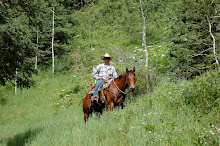
Growing up on a cattle operation north of Blackie, Alberta, I was raised with a healthy respect for those who laid the foundations of the ranching industry. From the books my Dad read, I could tell that he stood on the shoulders of great ranchers that have gone before him. One man, that had a stature that could very likely hold up my Dad, is a true legend in the eyes of many Canadian cowboys and city folks alike. His name was John Ware (1845-1905).
Born into slavery in South Carolina, John Ware understood the value of treating all men, regardless of color of skin, with dignity and respect. Perhaps his upbringing had allot to do with the development of admirable character qualities such as: being good natured, a hard worker, honest, and a family man. At the expense of being a real gentleman, when John Ware settled in southern Alberta he was given a nickname that included a common racial slur toward black people. What's more, he was known by the Blackfoot First Nations people as "Matoxy Sex Apee Quin" (bad black white man). The Blackfoot's figured he was some how connected to the spirit world because of his uncanny strength, and sizable presence standing over 6 feet tall and weighing somewhere in the area of 230 lbs.
John Ware's contribution to Canadian history was in large part due to his skill as a cowboy. After leaving the Carolina's, he learned the skills of being a cowhand in Texas. Leaving Texas, John Ware headed north arriving in Idaho in 1882. While in Idaho, the talented cattlemen joined a cattle drive that was taking a herd to Alberta. Upon arrival, John Ware took a real liking to Alberta. Perhaps it was the freedom from discrimination that was not a reality in the southern states. Maybe he was motivated by opportunity and a foreseeable future in the ranching business. Whatever may be the case, Ware ended up working on the Bar U ranch (southwest of High River, AB) and Quorn ranches. It wasn't long before John Ware developed a reputation of being a stellar cowhand, a talented horse trainer, and a man of influence among the people of his day.
By the turn of the century, John Ware had a wife named Mildred, 5 children, and a spread northeast of Duchess, Alberta. Unfortunately, the Ware family was forced to leave after a spring flood wiped out their home. Hitting the trail once again (1902), John and his family moved to an area I consider to be the most beautiful place outside of heaven. South West of Calgary, in high country, is where John Ware spent the remaining time of his life, in an old log cabin that overlooked what is known as Ware Creek. Three years later, tragedy struck the Ware family with the death of John's wife Mildred to pneumonia (1905). Despite John Ware's impressive horsemanship and claim that he had never been thrown from a horse (a claim that is rare among cowboys), his life was ended the same year as his wife's in a fatal horse wreck. Leaving behind four sons and a daughter that was 12 years old at the time named Nettie, the Ware family also left a legacy in western Canadian culture.
In the life of such a man, one can attribute John Ware's success to God's common grace. Were it not for Ware's influence, Canadian cattlemen would not have a history worth writing about. His character and competence as not only a cowboy, but as a forefather of Alberta history cannot be overlooked. Some say that John Ware discovered Turner Valley oilfields with the flick of a match, and invented Steer Wrestling 20 years before the Rodeo event came to the Calgary Stampede. Clearly the life of John Ware contributed a great deal toward the prosperity enjoyed by Albertans even today.

No comments:
Post a Comment